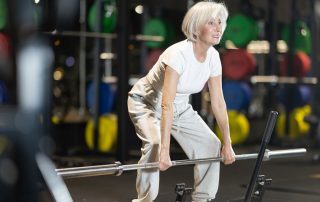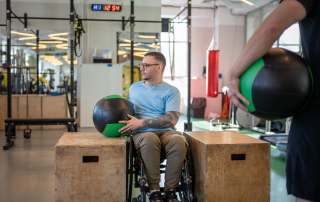How to Protect Your Back and Joints in Winter
As temperatures drop and winter settles in, many people notice an increase in stiffness, aches, or back discomfort. This isn’t a coincidence. Cold weather can cause muscles to tighten and joints to feel less flexible, making everyday movements feel more difficult than usual. At the same time, people often move less in winter, whether it’s due to icy conditions, shorter daylight hours, or spending more time indoors, which can present one set or problems with back and joint stiffness. On the flipside, heading outdoors, whether to shovel snow, play winter sports, carry groceries or simply walk on slippery surfaces [...]
Menopause Joint and Muscle Pain: The Effects of Hormonal Shifts
While much of the mainstream discussion around menopause symptoms focuses on hot flashes, mood changes, difficulty concentrating and sexual health changes, the musculoskeletal changes are often overlooked.However, the effects of menopause on joints, muscles, bones and tendons that occur during this time are far reaching and have serious consequences. The disability and frailty that can occur often leads to decreased quality of life and increased mortality in post-menopausal women.In this article we will look at the effects of menopause on the musculoskeletal system, including menopause joint and muscle pain. We will also discuss common injuries that occur in menopausal women [...]
6 Brain-Healthy Lifestyle Strategies for Women: A Physiotherapist’s Guide
Being brain healthy is a key factor in allowing you to meet life's demands. Women’s brain health is shaped by a unique interplay of hormones, life stages, stress, and lifestyle factors. From the cognitive intensity of young adulthood to the transitions of pregnancy, postpartum recovery, perimenopause, and menopause, women often experience shifts in mood, memory, focus, and overall physical and cognitive resilience. Movement is one of the most powerful tools women have to support a healthy brain—and physiotherapy provides evidence-based strategies that help women build habits that protect and optimize brain function across the lifespan. In this guide, we’ll [...]
Skier’s Thumb Treatment & Other Common Skiing Hand Injuries
The winter season offers us an opportunity to engage in outdoor winter sports and activities, like skiing. Whether you are a professional skier or a beginner, the risk of injury while skiing is high due to the nature of the sport with its combination of high speeds, dynamic and unpredictable environment, mechanics of the equipment and individual factors. Data from the Canadian Hospitals Injury Reporting and Prevention Program[i] [ii] (CHIRPP) capturing information from 20 emergency departments across Canada between October 1, 2016 and January 11, 2024, reported 5,434 alpine skiing-related injuries. In this blog, we will focus on the most common [...]
How Resistance Training Reduces Risk of Osteoporosis Fractures
A diagnosis of osteoporosis can sometimes come with fear, anxiety, and many unanswered questions. What does this mean for my future? What comes next in terms of treatments and medications? How will I manage physically? The already frightening prospect of falling can suddenly seem more dangerous and detrimental in the face of osteoporosis. However, what some don’t realize is that physiotherapy and resistance training are simple and easy methods to strengthen the very structures affected by the disease - the bones - and reduce your risk of osteoporosis fractures. In this article, I will discuss osteoporosis and the positive [...]
COM-B Framework: Leveraging Behaviour Change Science in Physiotherapy
When people start physiotherapy, they often have a clear goal in mind—reducing pain, regaining strength, walking again, or simply getting back to activities that matter. Yet, one of the biggest challenges in rehabilitation isn’t the treatment itself—it’s maintaining the motivation and consistency to do what’s needed outside the clinic. Many clients leave their appointments feeling inspired, but life gets busy, fatigue sets in, or frustration takes over. Home exercises are missed, daily habits don’t change, and progress slows. It’s a familiar story for both clients and physiotherapists. A story we are all too familiar with. Fortunately, behaviour change science [...]






